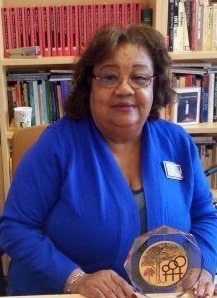 The SAWH has lost a leader, mentor, and friend with the passing of Jacqueline Anne Rouse, a past president of our organization and Professor Emerita of Georgia State University. Professor Rouse died Tuesday, May 12, 2020, after a short illness. Her Georgia State colleague Glenn Eskew wrote the following tribute:
The SAWH has lost a leader, mentor, and friend with the passing of Jacqueline Anne Rouse, a past president of our organization and Professor Emerita of Georgia State University. Professor Rouse died Tuesday, May 12, 2020, after a short illness. Her Georgia State colleague Glenn Eskew wrote the following tribute:
One of the nation’s leading scholars on black women’s history, Dr. Rouse published to great acclaim on the topic and received accolades for her groundbreaking work on such leading figures as Margaret Murray Washington, Lugenia Burns Hope, and Septima P. Clark. In recognition of her scholarship and service, Dr. Rouse received the Founding Mothers/Presidential Award of the Southern Association of Women Historians in 2016 and was an Honoree at the Cross-Generational Dialogues in Black Women’s History at Michigan State University Comparative Black History Symposium in 2015.
A native of Virginia with a proud family history of independent black land owners in the rural piedmont, Dr. Rouse earned her bachelor’s degree in Afro-American History from Howard University. She spent several years teaching in the Department of Social Sciences at Palm Beach Junior College in Florida. Upon moving to Georgia, she completed a master’s degree in African American history from Atlanta University where, for much of the 1980s, she served as Assistant Editor on The Journal of Negro History under editor Alton Hornsby, Jr. She briefly returned to the D. C. area when she held an internship at the Anacostia Museum of the Smithsonian Institution. Dr. Rouse undertook doctoral training in the Institute for the Liberal Arts at Emory University where she completed her Ph.D. in American Studies.
A series of teaching posts at such institutions as the Georgia Institute of Technology, Jackson State University, and Morehouse College followed before the GSU Department of History hired Dr. Rouse in 1991. Once on the GSU faculty, Dr. Rouse became an advocate for Africana Studies at the school and served as the acting Chair in the early days of the GSU Department of African American Studies in which she retained an adjunct appointment and continued to serve as an advisor for departmental leadership. Also at GSU, Dr. Rouse became a founding member of the Core Faculty for the Women Studies Institute. Throughout this time, Dr. Rouse held fellowships with the Carter G. Woodson Distinguished Scholar-in-Residence for the Association of the Study of African American Life and History, Inc., in Washington, D. C.; the Interdenominational Theological Center in Atlanta; and Dartmouth College in New Hampshire.
As a nurturing mentor of students, Dr. Rouse had few equals, in particular working with hundreds of black students, several of whom went on to secure graduate degrees, many in history. At GSU, Dr. Rouse personally advised to completion eleven dissertations in the Department of History written by black students and six written by white students, along with thirteen master’s theses. For the Department of African American Studies, she participated in directing four master’s theses along with a handful more in other departments. She retired from GSU in 2017.
Best known for her biography of Atlanta’s leading African American suffragette and founder of the Neighborhood Union, Lugenia Burns Hope: Black Southern Reformer, Dr. Rouse also joined Barbara A. Woods and Vicki Crawford as co-editors of the seminal work, Women in the Civil Rights Movement: Trailblazers and Torchbearers, 1941-1965. At the time of her death, she was revising a manuscript on the life of South Carolinian Septima P. Clark entitled Nurturing Seeds of Discontent: Septima P. Clark and the Promise of Citizenship.
Active in the profession, Dr. Rouse held numerous leadership positions in many organizations from the Association of the Study of African American Life and History and the Southern Historical Association to the Southern Association for Women Historians and the Association of Black Women Historians, Inc. Longtime members of the Georgia Association of Historians may recall Dr. Rouse delivered the keynote address at the annual meeting in 1997. Always a cordial colleague, Dr. Rouse voluntarily undertook numerous tasks and completed them expertly, making her a popular person to appoint to committees.
A resident of Decatur and leader in her church, Dr. Rouse leaves behind to mourn her loss a sister and other family members, friends across the Atlanta community, dozens of saddened colleagues and professional associates, and hundreds of students whose lives were changed through her generous mentoring as a compassionate teacher.
